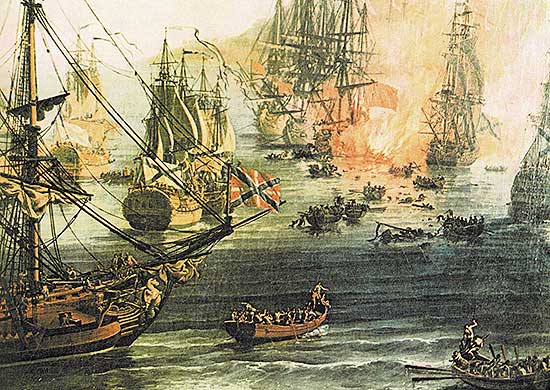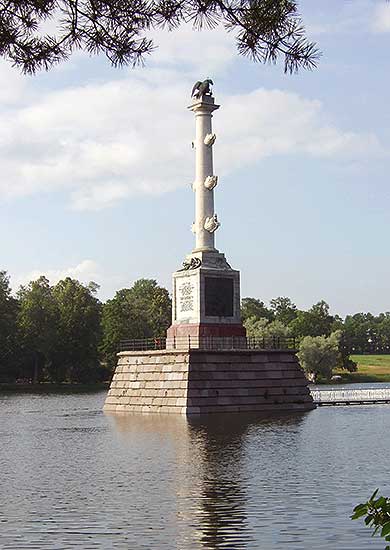
Key words to understand the Battle of Chesma
/ Главная / Russkiy Mir Foundation / Publications / Key words to understand the Battle of ChesmaKey words to understand the Battle of Chesma

The Battle of Chios Strait. Photo credit: encyclopedia.mil.ru
Starting from Peter the Great days, Russian glossary of nautical terms was compiled based on Dutch terms. Furthermore, it experienced a significant impact from English, German and Italian terminology. Events associated with naval glory of Russia can be reconstructed through interpretation of those inherent terms. The Battle of Chesma is one of such events.
Yevgeny Tarle, a renowned scholar and historian, wrote The Battle of Chesma and the First Russian Expedition to the Archipelago in 1769–1774, a monograph where he presented detailed description of the naval battle with participation of the Russian fleet under the command of Alexei Orlov. The events can be reconstructed drawing upon some obsolete or adapted definitions and concepts.
As it is commonly known, the Chesma operation was the result of a multimove political game by Catherine the Great who efficiently used trade and economic confrontation between France and England back then to the benefit of Russia. Although the British joined banners with Russia in the Russian-Turkish military operation, they could not ignore their own benefit. The Empress remarked in one of her letters: “Having regard to well-known jalousie that all British without exceptions have to naval undertakings of other states, it is truly impossible to be sure that they look at our expedition from within without any jealousy.” What is that jalousie? It is simply la jalousie (“window blinds” in French) - jealousy.
Alexei Orlov, a brother of Grigory Orlov, the favorite of Catherine the Great back then, controlled the operation. He was a strong-willed, risky person who saw no obstacles. At the court, they called him a balafr (from French la balafre – “scar”) for horrible sword cut across his face. Historians rightly believe that Catherine kept cautious watch on Orlov for his general’s gallantry, as well as condottiere’s impudence (from Italian condottiere – “mercenary”, idiom.: a person who will stop at nothing for the sake of benefit) and manners of ushkuinik (a leader of an armed band of men or river pirates that attacked on ushkuis, flat-bottomed boats propelled by oars and sail). There was a risk that the willful Orlov would not refrain from excessive corsairism (from Italian corsare - “sea robber, pirate” <from Latin corsus – “running”), or, as they used to say back then, armateurism (French armateur, from armer - “to arm”). But, fortunately, matters didn't come to that. The strong-willed general harnessed his energy in the right direction, suppressed the confrontation of the international group of admirals claiming leadership, and enabled the Russian fleet, half the size of the Turkish one, to fearlessly attack the stunned enemy in Chesme Bay.
Having settled the operation plan in details, the Russian fleet sailed out for the battle. Experienced Admiral Spiridov sailed on his ship in the advance guard, and then cordebatalia joined the action (from the French corps de bataille – “the middle part of the fleet located between the advance guard and the rear guard”).
The onslaught of the Russians was so aggressive that panic broke out on Turkish ships, and the enemy fleet made a hasty retreat being showered with Russian cannon balls and brandkugels (from German brand - “fire, flame”, kugel - “ball”), incendiary shells.
The Turks responded with sporadic firing, and since their cannons had been awkwardly arranged, they fired too high and hit rangout only (from Dutch rondnout - literary "round tree") – wooden rigging designed to set sails, also destroying masts and spars. Meanwhile, closely-grouped Turkish ships, one by one, caught fire and exploded, showering others with flake of fire; sailors rushed overboard and tried to swim to the shore.
The Russian side also suffered losses. Spiridov, in Sviatoi Evstafii, had a close-range battle with a Turkish ship. The mainmast of the latter came down and damaged the Russian ship. Fire flakes and smoldering pieces of wood got into kruidt-camera (from Dutch kruidt – “gunpowder”, and kamer – “room”), a storage site for gunpowder and other flammable substances. It caused Sviatoi Evstafii to blow up immediately and sink in a few minutes.
Aiming to rescue remaining of the fleet, the Turks attempted to tow their ships ashore with rowing galleys and shebeks (from Italian sciabecco <Arabic sabbak), small Mediterranean three-rigged vessels. At that time, the battle was joined by Russian branders (German Brander, from brannen - “burn”), warships filled with combustible substances intended to set enemy ships on fire. Their task was to get close to an enemy ship, attach to it and blow up their ship to destroy the enemy one. The crew had to be brave, act very quickly and leave the board in a prompt manner not to die. The task was supervised by the Zeugmeister (German Zeugmeister - chief of naval artillery), brigadier Gannibal, the famous ancestor of Alexander Pushkin. He skillfully managed maneuvers of four branders.
Short notes about the Battle of Chesma in schan logbooks of Russian war ships offer insight into those events. The schans (from Dutch schans – aft deck of a sailing ship) was the place where officers of the watch used to stay and record developments, including those that followed the battle. And this is what happened after the battle: Aleksei Orlov ordered to rescue wounded Turkish sailors from the water and bring them to Russian ships "to dress up the wounds and provide available assistance." The Turks were shocked by such attitude towards prisoners, because it was contrary to their thinking. Those saved were given freedom after recovery "under the highest authority of Her Imperial Majesty."

The Chesme Column in Catherine Park of the former Russian royal residence of Tsarskoye Selo. Photo credit: encyclopedia.mil.ru
Yevgeny Tarle, a historian, wrote, “Victory of the Russian fleet was the outright triumph. In addition to all coastal artillery (19 copper cannons) brought to the Russian vessels, and “so that the fleet had more glory”, triumphant Orlov ordered to take also the copper artillery “from the burned enemy bottoms”, because apart from these “bottoms”, there was absolutely nothing left of the Turkish fleet. <...> And as the story of the through defeat of the huge battle fleet became known, the glory of the Russian sailors resounded throughout the world.”
New publications

 Mikhail Kalatozov, a director who transformed the world of cinematography in many ways, was born 120 years ago. He was a Soviet film official and a propagandist. Above all, he was capable of producing movies that struck viewers with their power and poetic language.
Mikhail Kalatozov, a director who transformed the world of cinematography in many ways, was born 120 years ago. He was a Soviet film official and a propagandist. Above all, he was capable of producing movies that struck viewers with their power and poetic language.  Ukrainian authorities have launched a persecution campaign against the canonical Ukrainian Orthodox Church (UOC), the biggest one in the country's modern history. Over the past year, state sanctions were imposed on clergy representatives, searches were conducted in churches, clergymen were arrested, criminal cases were initiated, the activity of the UOC was banned in various regions of the country, and monasteries and churches were seized.
Ukrainian authorities have launched a persecution campaign against the canonical Ukrainian Orthodox Church (UOC), the biggest one in the country's modern history. Over the past year, state sanctions were imposed on clergy representatives, searches were conducted in churches, clergymen were arrested, criminal cases were initiated, the activity of the UOC was banned in various regions of the country, and monasteries and churches were seized.  When Nektary Kotlyaroff, a fourth-generation Russian Australian and founder of the Russian Orthodox Choir in Sydney, first visited Russia, the first person he spoke to was a cab driver at the airport. Having heard that Nektariy's ancestors left Russia more than 100 years ago, the driver was astonished, "How come you haven't forgotten the Russian language?" Nektary Kotlyaroff repeated his answer in an interview with the Russkiy Mir. His affinity to the Orthodox Church (many of his ancestors and relatives were priests) and the traditions of a large Russian family brought from Russia helped him to preserve the Russian language.
When Nektary Kotlyaroff, a fourth-generation Russian Australian and founder of the Russian Orthodox Choir in Sydney, first visited Russia, the first person he spoke to was a cab driver at the airport. Having heard that Nektariy's ancestors left Russia more than 100 years ago, the driver was astonished, "How come you haven't forgotten the Russian language?" Nektary Kotlyaroff repeated his answer in an interview with the Russkiy Mir. His affinity to the Orthodox Church (many of his ancestors and relatives were priests) and the traditions of a large Russian family brought from Russia helped him to preserve the Russian language.

 The leaders of the Friends of the Great Russia cultural association (Amici Della Grande Russia) in Italy believe that the Western policy of abolishing Russian culture in Europe has finally failed. Furthermore, it was doomed to failure from the beginning.
The leaders of the Friends of the Great Russia cultural association (Amici Della Grande Russia) in Italy believe that the Western policy of abolishing Russian culture in Europe has finally failed. Furthermore, it was doomed to failure from the beginning.  Name of Vladimir Nemirovich-Danchenko is inscribed in the history of Russian theater along with Konstantin Stanislavski, the other founding father of the Moscow Art Theater. Nevertheless, Mr. Nemirovich-Danchenko was a renowned writer, playwright, and theater teacher even before their famous meeting in the Slavic Bazaar restaurant. Furthermore, it was Mr. Nemirovich-Danchenko who came up with the idea of establishing a new "people's" theater believing that the theater could become a "department of public education."
Name of Vladimir Nemirovich-Danchenko is inscribed in the history of Russian theater along with Konstantin Stanislavski, the other founding father of the Moscow Art Theater. Nevertheless, Mr. Nemirovich-Danchenko was a renowned writer, playwright, and theater teacher even before their famous meeting in the Slavic Bazaar restaurant. Furthermore, it was Mr. Nemirovich-Danchenko who came up with the idea of establishing a new "people's" theater believing that the theater could become a "department of public education."  "Russia is a thing of which the intellect cannot conceive..." by Fyodor Tyutchev are famous among Russians at least. December marks the 220th anniversary of the poet's birth. Yet, he never considered poetry to be his life's mission and was preoccupied with matters of a global scale. Mr.Tyutchev fought his war focusing on relations between Russia and the West, the origins of mutual misunderstanding, and the origins of Russophobia. When you read his works today, it feels as though he saw things coming in a crystal ball...
"Russia is a thing of which the intellect cannot conceive..." by Fyodor Tyutchev are famous among Russians at least. December marks the 220th anniversary of the poet's birth. Yet, he never considered poetry to be his life's mission and was preoccupied with matters of a global scale. Mr.Tyutchev fought his war focusing on relations between Russia and the West, the origins of mutual misunderstanding, and the origins of Russophobia. When you read his works today, it feels as though he saw things coming in a crystal ball...